Jinli Street, also called Jinli Old Street, is a historic and cultural hub in Chengdu, China. As part of the Wuhou Shrine Museum complex, this charming pedestrian street showcases architecture from the late Qing Dynasty and early Republic of China. It’s a top attraction for tourists, blending history, scenic beauty, and local cuisine. Jinli Street offers a unique glimpse into Sichuan folk customs and Three Kingdoms culture, making it an ideal spot to explore and enjoy Chengdu’s distinctive charm.
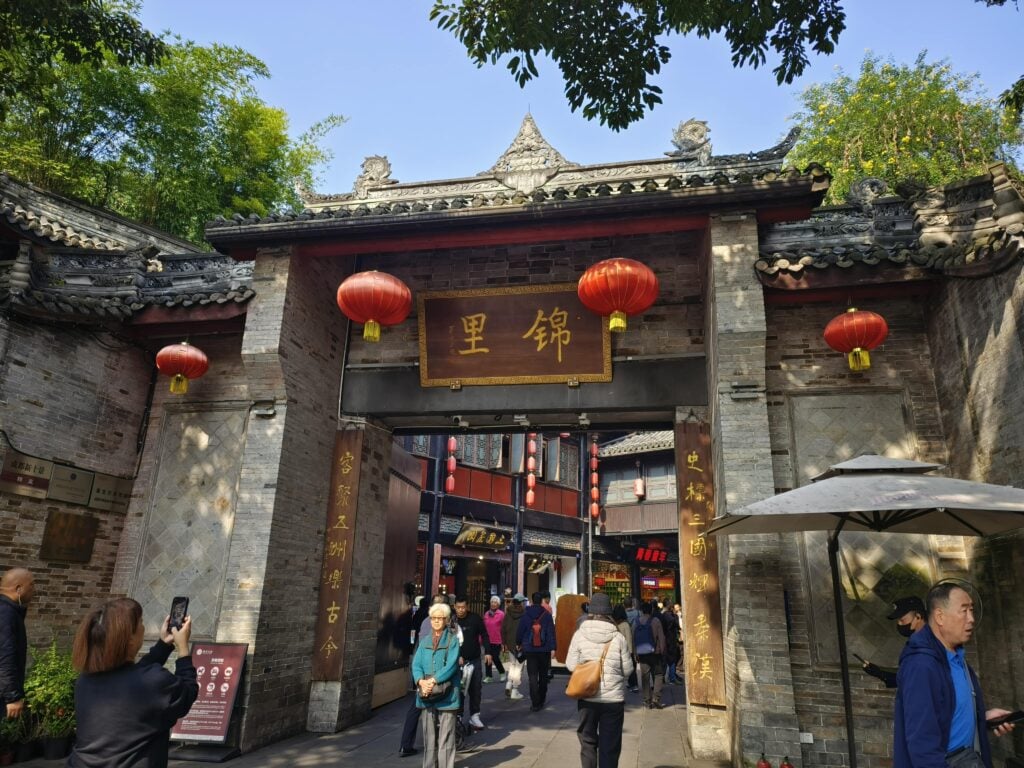
Jinli Ancient Street Facts
- Chinese: 锦里古街
- Type: Historic Walking Areas
- Location: No. 231 Wuhouci Avenue, Wuhou District, Chengdu
- Length: 550 meters
- Opening Hours: 24 hours. Some snack stores will close around 22:00, and some drinking bars will open all night
- Recommended Visiting Hours: 2 ~ 3 hours
- Best Time: All year round
- Tickets: Free
Jinli Street features lotus ponds, stone bridges, lakeside paths, and traditional courtyards alongside its shops and restaurants. Unlike Kuanzhai Alley, it carries a Three Kingdoms cultural vibe from its location near Wuhou Shrine. This historic area perfectly captures Chengdu’s essence – with teahouses, inns, bars, opera stages, snack stalls, handicrafts, and restaurants all in one lively district.
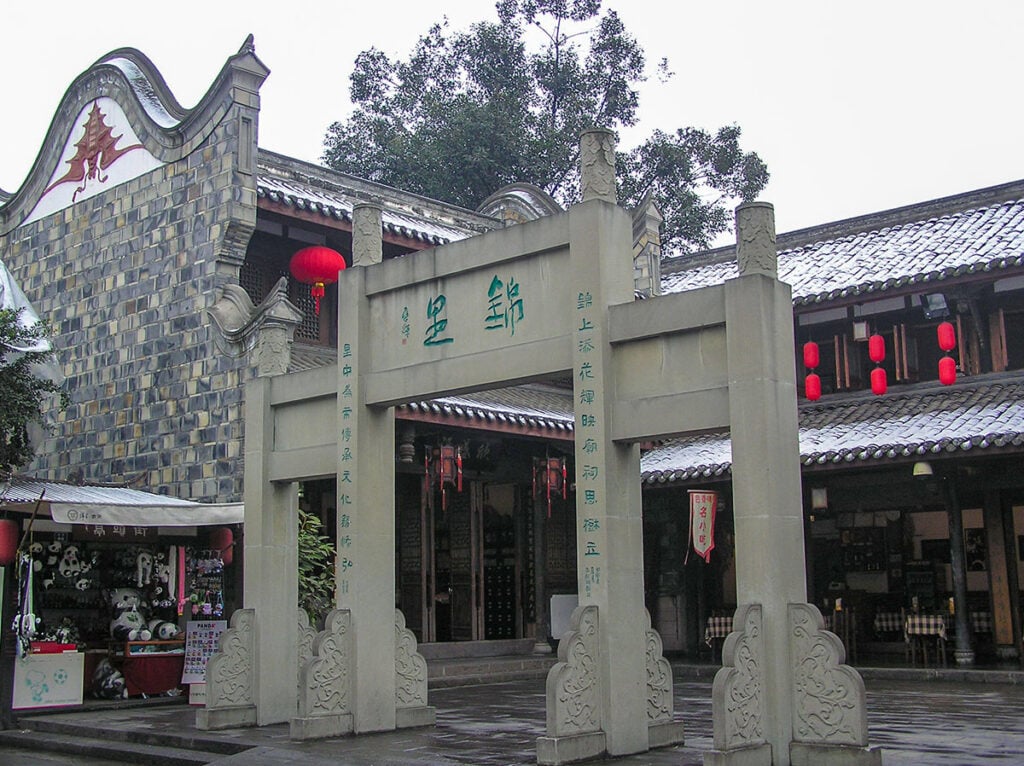
History
Known as ‘First Street of the Shu Kingdom’, Jinli dates back to the Qin Dynasty (221-206 BC) when it flourished as the center of baldachin (a rich ornamental cloth) production. During the Three Kingdoms period (221-263 AD), it became both a strategic supply base for Zhuge Liang’s campaigns and the heart of Sichuan’s famous brocade trade – hence its name ‘Jinli’ (Brocade Lane). After centuries of changes, Wuhou Temple Museum restored this historic commercial street in 2004, reviving its ancient charm while preserving Chengdu’s cultural legacy.
Jinli Pedestrian Street Highlights
Jinli Ancient Street is one of the oldest shopping streets in Chengdu. On the street, you can experience the real life and authentic culture of Chengdu people.
Local Food
As a must-visit destination in Chengdu, Jinli Street gathers famous snacks from across Sichuan, earning its reputation as a ‘food paradise’. Visitors can sample various local specialties. Strolling along Jiupin Street, you’ll find diverse delicacies including Zhangfei beef, pork intestine noodles, rice cakes, leaf-wrapped glutinous rice buns, ‘Three Cannons’ sweet rice balls, spicy ‘Sadness’ cold noodles, bamboo-leaf steamed beef, crispy beef pancakes, bobóji chicken skewers, and candied fruits. Here, tourists can freely enjoy snacks while exploring, experiencing Chengdu’s leisurely food culture.
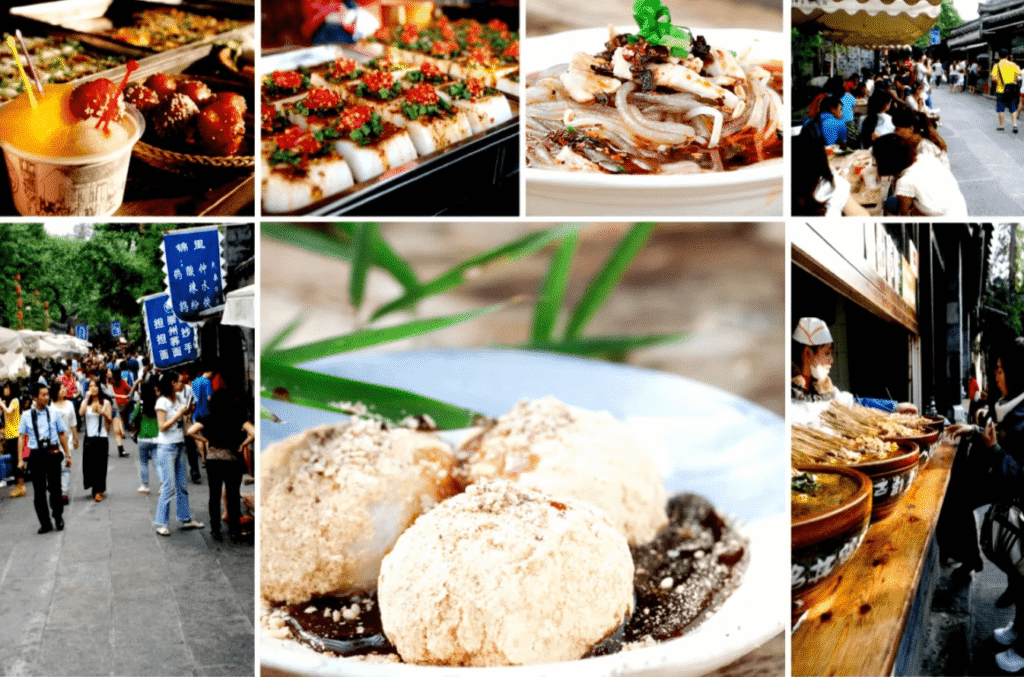
Folk Artisan Performances
Jinli Ancient Street is a vibrant showcase of traditional folk arts. Along the bustling stalls, skilled artisans demonstrate crafts like Sugar painting, clay figurines, Shu Embroidery and paper cutouts. You can watch captivating performances such as shadow puppet shows and hand puppet theater. The handmade items are delicate and lifelike. They make perfect souvenirs and offer a glimpse into local culture and China’s artistic heritage. Whether observing the craftsmen at work or purchasing their creations, visitors get a true taste of Chengdu’s living traditions.
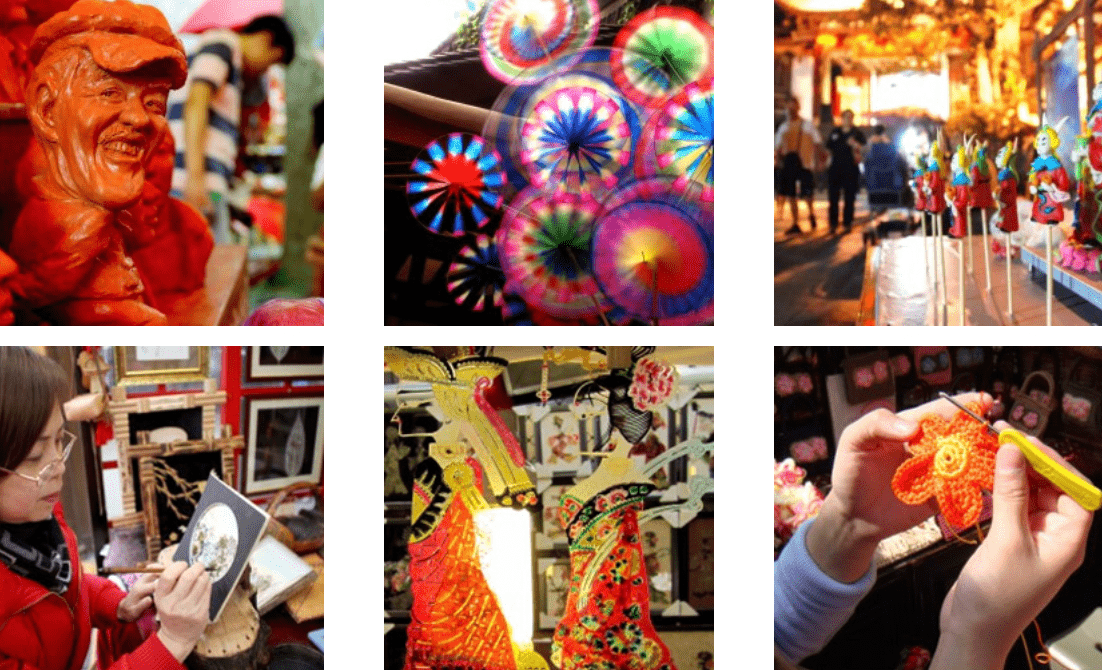
Sichuan Opera Performance
In the middle of Jinli Street stands an ancient-style wooden stage where classic Sichuan Opera performances take place. Visitors can marvel at the opera’s famous face-changing acts, where performers swiftly switch masks to show emotions. For a more relaxed experience, nearby teahouses and restaurants offer free Sichuan Opera shows with food or drink orders. These lively performances preserve China’s rich theatrical traditions while entertaining modern audiences. The street also hosts open-air movies, traditional wedding shows that guests can join, and other cultural displays like night watch ceremonies and bridal sedan processions.
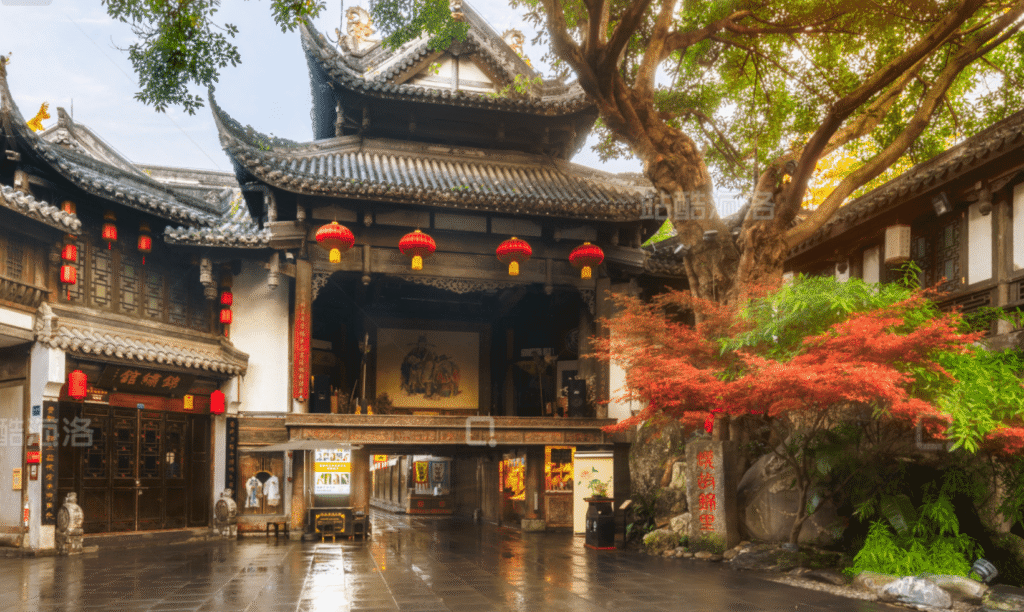
Thematic Activities
During traditional festivals, Jinli Street comes alive with special themed activities. Visitors can enjoy lantern fairs during the Lantern Festival, snack festivals, zongzi (sticky rice dumplings) eating competitions for the Dragon Boat Festival, and moon-viewing gatherings on Mid-Autumn Festival. Chinese Valentine’s Day brings its own unique celebrations, making Jinli a perfect place to experience China’s festive culture throughout the year.
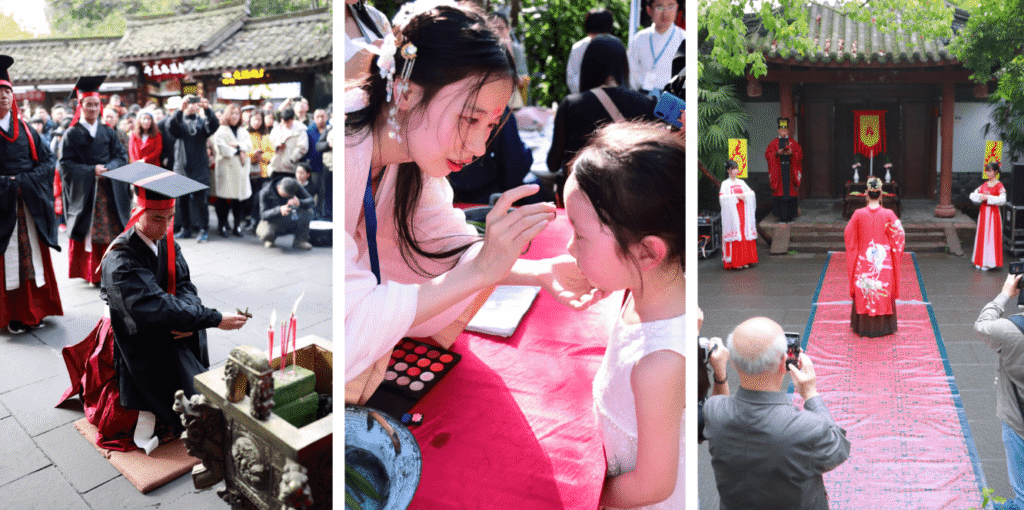
Accommodation at Jinli Ancient Street
Visitors can stay overnight in Jinli Ancient Street. All the inns in Jinli are built in the late Ming and early Qing architectural styles, so visitors can enjoy a unique experience staying in Jinli Ancient Street. These inns are well-equipped, but the prices are higher than ordinary hotels. So, if you want to find a more affordable hotel, you can stay near Jinli Ancient Street.
Best Time to Visit Jinli Street
The best time to visit Jinli Street is in the late afternoon or evening when all food stalls and shops are open. Evening is particularly magical – with fewer crowds, the ancient alley glows under hundreds of red lanterns (lit daily after sunset, around 7:30 PM in summer/6 PM in winter). Nighttime also offers cooler temperatures and a more authentic atmosphere as locals gather for street performances and late-night snacks.
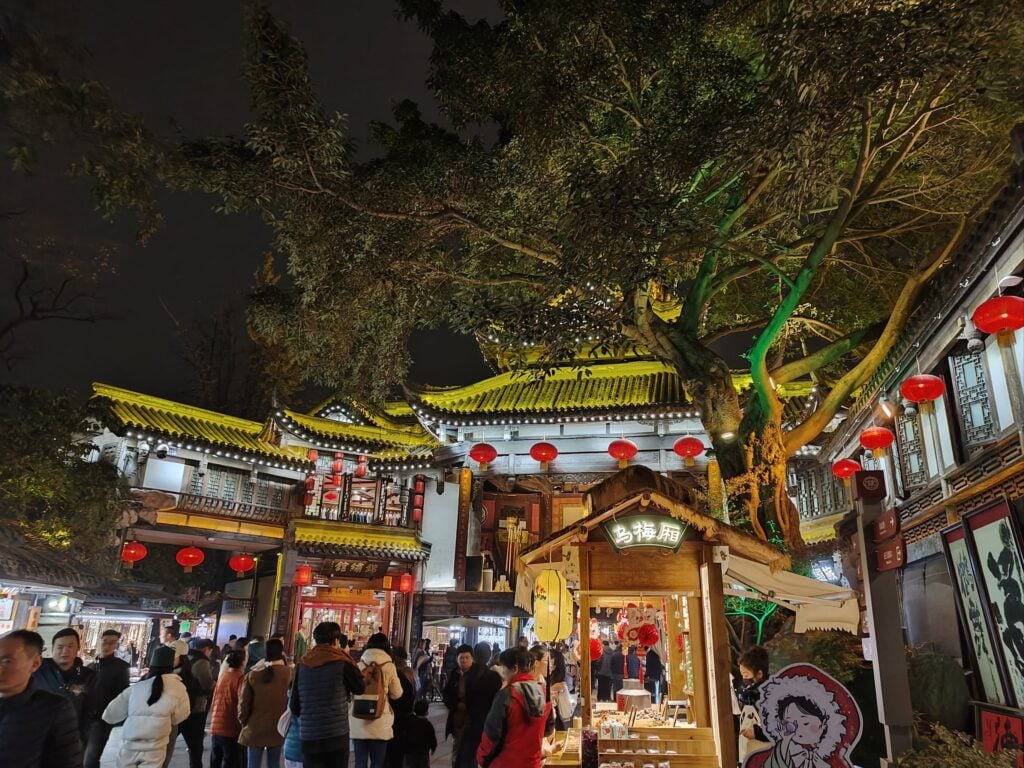
Recommended Tour Routes for Jinli Ancient Street
South entrance of Jinli Ancient Street – Jiupin Snack Street (taste snacks) – Ancient stage (watch Sichuan opera performances) – Zhuge Well – First Archway of Western Shu – Fushou Alley (take photos) – Huanglongtan (enjoy the night view)
This is a 1.5-hour classic route, suitable for tourists with limited time, and can quickly visit the main attractions of the ancient street.
How to get to Jinli Street
- Take Metro Line 3 to Gaoshengqiao Station (Exit D), turn right onto Wuhouci Avenue, and walk about 600m to reach Jinli Street.
- Take Bus 1, G97, 57, 77, 82, 334, 335, 1126, and get off at Wu Hou Ci (Wuhou Temple) Station.